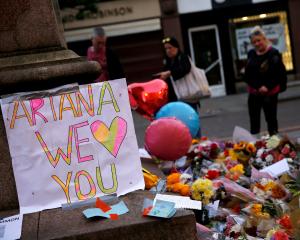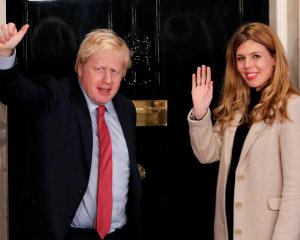
British Prime Minister Theresa May neared a deal with a Northern Irish Protestant party to save her premiership on Tuesday (local time) and confirmed Brexit talks would begin next week, amid growing calls for her to soften her approach to leaving the European Union.
After losing her parliamentary majority in a botched gamble on a snap election, May is so weakened that her Brexit strategy has become the subject of public debate inside her own party, with calls for her to take a more business-friendly approach.
Seeking to avoid a second election that could deepen Britain's worst political turmoil since last June's shock vote to leave the EU, May edged closer to a deal to win the support of the Democratic Unionist Party (DUP).
She held talks with DUP leader Arlene Foster, whose eurosceptic Northern Irish party has 10 parliamentary seats and could shore up May's minority Conservative government.
"What we're doing in relation to the talks that we're holding, the productive talks we're holding with the Democratic Unionist Party, is ensuring that it is possible to, with their support, give the stability to the UK government that I think is necessary at this time," May told a news conference in Paris following a meeting with French President Emmanuel Macron.
Earlier, Foster said the talks were going well: "We hope soon to be able to bring this work to a successful conclusion."
May made clear the Brexit negotiations would begin on schedule despite the political uncertainty at home.
"I confirmed to President Macron that the timetable for the Brexit negotiation remains on course and will begin next week," May said after her meeting with the new French leader, who will be a key player in the Brexit talks.
"I think there is a unity of purpose among people in the United Kingdom. It's a unity of purpose, having voted to leave the EU, that their government gets on with that and makes a success of it."
During the election campaign, May cast herself as the only leader competent to navigate the tortuous Brexit negotiations that will shape the future of the United Kingdom and its $2.5 trillion economy.
Jeremy Corbyn, leader of the opposition Labour Party, which saw its number of parliamentary seats and share of the vote increase, said there could be another election this year or early in 2018 after last Thursday's vote produced no clear winner.

DESTABILISING RISK
The BBC reported that a deal with the DUP was expected to be signed on Wednesday. That would give May enough votes to pass her legislative agenda through parliament and govern, albeit with a wafer-thin majority.
But a deal with the DUP also risks destabilising Northern Ireland by increasing the influence of pro-British unionists. They have struggled for years with Irish Catholic nationalists, who want the British province to join a united Ireland.
Former British prime minister John Major said he was concerned May's plan to govern with the support of the DUP could pitch the province back into turmoil by persuading 'hard men' on both sides of the divide to return to violence.
"The last thing anybody wishes to see is one or other of the communities so aggrieved that the hard men, who are still there lurking in the corners of the communities, decide that they wish to return to some form of violence," Major told BBC radio.
"I am concerned about the deal. I am wary about it. I am dubious about it," Major said.
Irish nationalist party Sinn Fein said the prospect of a British agreement with the DUP was causing anxiety and fear.
While the DUP are deeply eurosceptic, they have balked at some of the practical implications of a so-called hard Brexit -- including a potential loss of a "frictionless border" with the Republic of Ireland -- and talks will touch on efforts to minimise the potential damage to Northern Ireland.











